We spoke with Duriel E. Harris, editor of Obsidian: Literature & Arts of the African Diaspora, in our latest Member Spotlight.
What is the history behind Obsidian: Literature & Arts of the African Diaspora? When was it founded and what is its mission?
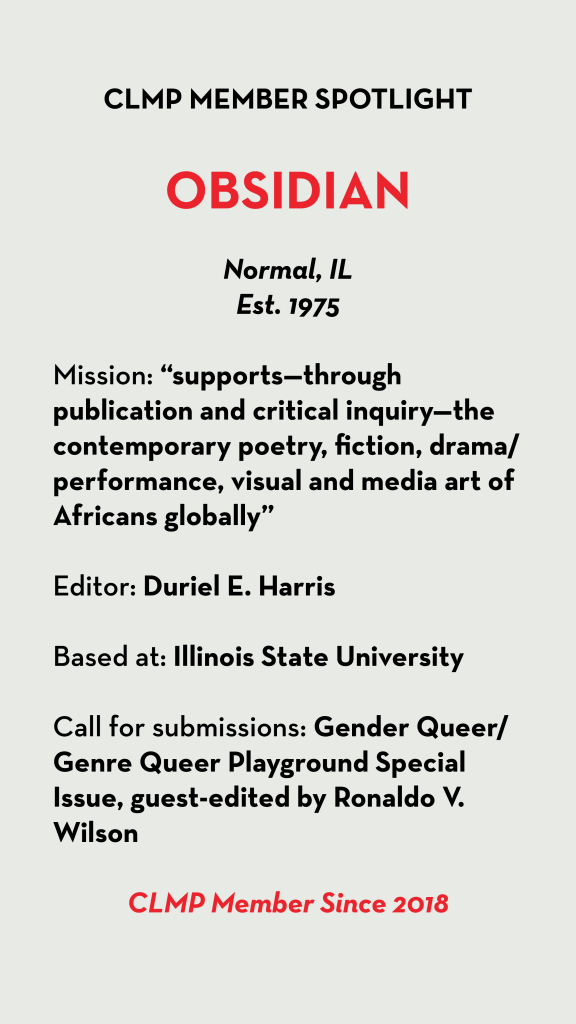 Obsidian supports—through publication and critical inquiry—the contemporary poetry, fiction, drama/performance, and visual and media art of emerging and established Black and African writers, artists, and scholars from around the world. The late poet Alvin Aubert founded the journal in 1975 under the name Obsidian: Black Literature in Review, embracing the core intentions of the Black Arts Movement (BAM). Extending and augmenting BAM’s strategic efforts, Obsidian would serve to showcase and cultivate the tremendous wealth of Black creativity that was historically and actively overlooked and disregarded by white gatekeepers.
Obsidian supports—through publication and critical inquiry—the contemporary poetry, fiction, drama/performance, and visual and media art of emerging and established Black and African writers, artists, and scholars from around the world. The late poet Alvin Aubert founded the journal in 1975 under the name Obsidian: Black Literature in Review, embracing the core intentions of the Black Arts Movement (BAM). Extending and augmenting BAM’s strategic efforts, Obsidian would serve to showcase and cultivate the tremendous wealth of Black creativity that was historically and actively overlooked and disregarded by white gatekeepers.
In the early years, with help from poet Sonia Sanchez, Aubert mobilized other writers, artists, and activists to fund Obsidian, becoming a vital forum for the celebration and advancement of Black culture in a thriving independent Black public sphere.
Since 1975 Obsidian has realized expanded possibilities for growth that have sustained a deepening commitment to Black literature and art. Obsidian started at SUNY Fredonia and later found a home at Wayne State University and North Carolina State University with notable editors, such as Gerald Barrax, Afaa Michael Weaver, and Shelia Smith McKoy. In 2014 I welcomed Obsidian to Illinois State University. Under my guidance, Obsidian champions its mission, uplifting the unique ways contributors document, engage, and respond to the world, particularly during this unprecedented time of economic/public health/social upheaval.
In 2015 I expanded Obsidian to a full publishing platform offered biannually in print and year-round online. Celebrating 46+ years, Obsidian now has the subtitle Literature & Arts in the African Diaspora—highlighting our commitment to providing structural support to Black writers/artists in all stages of their careers and to publishing innovative, hybrid, and transmedia work that pushes boundaries of genre and conceptualizations of Black creativity. The premier U.S. publishing platform of African diaspora literature, currently led by me as editor in chief and Sheree Renée Thomas as associate editor, Obsidian has featured many acclaimed authors including Octavia Butler, Wanda Coleman, Terrance Hayes, Essex Hemphill, and Claudia Rankine. We’re also proud to be numerous contributors’ first place of publication. Welcoming established and emerging writers and artists helps to build communities and networks, encourages growth and development in arts practices, and showcases younger and emerging creators to established creators and larger publics.
 As a literary arts publication rooted in the BAM ethos of cooperative economics and collective action, we fully believe that through partnership and community engagement we rise together in support of Black literature and arts toward the triumph of all people. In that spirit, Obsidian collaborates with James Madison University’s Furious Flower Poetry Center to publish selections from their annual contest and with Chicago’s Rootwork Gallery to document landmark exhibitions. More recently we have initiated a partnership with The Poetry Foundation in support of Obsidian’s O|Sessions series. And in summer 2021 we joined Cave Canem, Furious Flower Poetry Center, The Hurston/Wright Foundation, and The Watering Hole to inaugurate Getting Word: Black Literature for Black Liberation, an annual collective fundraiser calling for the long-term support of Black literary arts organizations. Believing in the power and value of Black literature, Black art, and Black excellence, Obsidian will continue investing in the literary ecosystem of Black voices, and serving as a crucial and celebrated resource for scholarship and publishing in the African diaspora.
As a literary arts publication rooted in the BAM ethos of cooperative economics and collective action, we fully believe that through partnership and community engagement we rise together in support of Black literature and arts toward the triumph of all people. In that spirit, Obsidian collaborates with James Madison University’s Furious Flower Poetry Center to publish selections from their annual contest and with Chicago’s Rootwork Gallery to document landmark exhibitions. More recently we have initiated a partnership with The Poetry Foundation in support of Obsidian’s O|Sessions series. And in summer 2021 we joined Cave Canem, Furious Flower Poetry Center, The Hurston/Wright Foundation, and The Watering Hole to inaugurate Getting Word: Black Literature for Black Liberation, an annual collective fundraiser calling for the long-term support of Black literary arts organizations. Believing in the power and value of Black literature, Black art, and Black excellence, Obsidian will continue investing in the literary ecosystem of Black voices, and serving as a crucial and celebrated resource for scholarship and publishing in the African diaspora.
Can you tell us more about O | Sessions? In addition, what is Obsidian Voices?
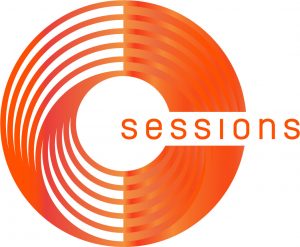 During the first months of the COVID-19 pandemic, the need for meaningful shared connection became increasingly more critical. In spring 2020 Obsidian responded creatively and collaboratively by founding #ObsidianVoices to bring writers and audiences together in celebration of newly created work. We presented the first #ObsidianVoices online events in May/June 2020 to share recently published work from Obsidian, featuring contributors to recently released general issues and themed special issues.
During the first months of the COVID-19 pandemic, the need for meaningful shared connection became increasingly more critical. In spring 2020 Obsidian responded creatively and collaboratively by founding #ObsidianVoices to bring writers and audiences together in celebration of newly created work. We presented the first #ObsidianVoices online events in May/June 2020 to share recently published work from Obsidian, featuring contributors to recently released general issues and themed special issues.
Our themed special issues are guest-edited and devoted to significant topics that advance discourses engaging diasporic arts and letters. Obsidian maintains a global profile through an international roster of guest editors who attract readership from within their communities and disciplines. These guest-edited issues uphold Obsidian’s distinction as one of the few U.S. literary platforms whose vision fully embraces the African diaspora. Drawing attendance from four continents, #ObsidianVoices has allowed us to gather online as Black communities deal with the ongoing material implications of COVID-19, health inequity, institutional racism, and exacerbated structural inequality.
O|Sessions was born in response to audience requests for deeper engagement with the artists presenting in #ObsidianVoices and in recognition of the need for more spaces for critical and creative exchange.
The series aims to magnify Obsidian’s impact by creating a pedagogical space unapologetically focused on illuminating Black presence and Black creative expression and imagination across the diaspora and further—beyond the divides of gender, sexuality, socioeconomic status, literary genre, embodiment, and age. O|Sessions is an annual series of online literary and performance-based craft workshops and is supported in part by The Poetry Foundation. With O|Sessions, Obsidian intends to advance the collective literary and artistic response to the ongoing and urgent need to protect the livelihoods and future creative contributions of Black creators disproportionately impacted by the COVID-19 pandemic.
In an era when all facets of Blackness are enduring persistent and violent attack, these series serve to extend the publishing platform and underscore the critical importance of amplifying Black voices, Black imagination, and Black resilience toward the protection/preservation of Black presence and Black futures.
We intend #ObsidianVoices and O|Sessions to serve as beacons for Black creators during the pandemic and beyond.
Obsidian is accepting submissions to the Gender Queer/Genre Queer Playground Special Issue, guest edited by Ronaldo V. Wilson, through December 1. Can you tell us more about this open call for submissions?
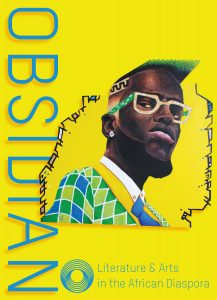 The Obsidian LGBTQIA+ Gender Queer/Genre Queer Playground special issue is focused on erotics, play, and the imagination. We’re excited to feature short stories, poetry, drama, hybrid genre, creative/critical interventions, interviews, multimedia visual and digital art, as well as music and soundscapes by emerging and established Black artists. We seek work grounded in the recognition of language as a site of contestation and the radical possibility of experiment.
The Obsidian LGBTQIA+ Gender Queer/Genre Queer Playground special issue is focused on erotics, play, and the imagination. We’re excited to feature short stories, poetry, drama, hybrid genre, creative/critical interventions, interviews, multimedia visual and digital art, as well as music and soundscapes by emerging and established Black artists. We seek work grounded in the recognition of language as a site of contestation and the radical possibility of experiment.
This issue will be a living testament to how trans, genderqueer, and nonbinary writers and artists are often at the leading edge of innovation, pushing the boundaries of genre, broadening the scope of text-based work with other art practices and mediums.
The call for submissions was announced at our QPlayaz|QPride event in June 2021, part of the multicultural interdisciplinary @Salon series now sustained by Obsidian to connect a diverse public allied in support of Black creativity. I founded ISU’s @Salon in 2011 as an annual free public event and theater of exchange. Featuring renowned local and regional artists live and in person, with digital works from an international roster of artists, this regular event offered an afternoon of conversation, poetry, performance, music, and visual arts to arts enthusiasts from Bloomington-Normal-area colleges and universities and the larger community. Welcoming national and international artist participants, as an online event Obsidian’s @Salon reaches larger and more diverse audiences. For the Playground special issue, we seek work that is visually provocative, stimulating, and striking. Work that is not afraid to invite and challenge our readers to participate in making meaning in unscripted/unconventional ways. The full text of the call can be found at https://obsidianlit.org/open-calls/.
Your publication is dedicated to featuring both literature and art in print and online. What are some of the challenges and rewards of focusing on multiple art forms in this way?
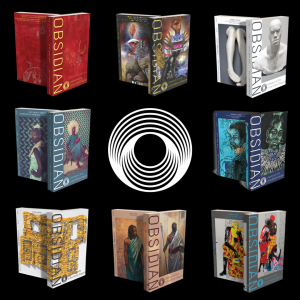 Historically, due to ingenuity and innovative necessity, Black makers have been creative innovators. In the U.S. context/in the contexts of imperialism, chattel slavery, colonialism, and Jim Crow, Black people, by circumstance, have had to be creative to survive and exceedingly creative to thrive. This focus on innovation and experiment better positions Black makers and culture workers to build vibrant/robust futures in the hostile environments of white supremacy and the accompanying monstrosities of the life-obliterating force that poet/thinker Aimé Césaire calls thing-ification. Few venues create space for authentic, self-determined Black joy and even fewer create space for authentic, self-determined Black play and the creations it engenders: for authentic, self-determined Black play is Black joy—its burgeoning intellect and its transformative potential—in action. Obsidian is a space for such Black play under my editorship. Obsidian encourages various manifestations of Black thought and creativity and supports this work by offering multiple platforms because a print journal simply does not allow for all of the modes Black artists and writers require. As such, Obsidian Digital is a companion to the journal, and together they make the publishing platform a more vibrant, versatile, expansive space for Black imagination, Black presence, Black futures. The challenge arises from the need to keep pace with the explorations of Black creators.
Historically, due to ingenuity and innovative necessity, Black makers have been creative innovators. In the U.S. context/in the contexts of imperialism, chattel slavery, colonialism, and Jim Crow, Black people, by circumstance, have had to be creative to survive and exceedingly creative to thrive. This focus on innovation and experiment better positions Black makers and culture workers to build vibrant/robust futures in the hostile environments of white supremacy and the accompanying monstrosities of the life-obliterating force that poet/thinker Aimé Césaire calls thing-ification. Few venues create space for authentic, self-determined Black joy and even fewer create space for authentic, self-determined Black play and the creations it engenders: for authentic, self-determined Black play is Black joy—its burgeoning intellect and its transformative potential—in action. Obsidian is a space for such Black play under my editorship. Obsidian encourages various manifestations of Black thought and creativity and supports this work by offering multiple platforms because a print journal simply does not allow for all of the modes Black artists and writers require. As such, Obsidian Digital is a companion to the journal, and together they make the publishing platform a more vibrant, versatile, expansive space for Black imagination, Black presence, Black futures. The challenge arises from the need to keep pace with the explorations of Black creators.
The needs and interests of our readers propel us forward on this course in today’s content-rich era. Engaging via multiple platforms allows Obsidian to reach and connect with and remain accessible to a diverse readership. In many parts of the world reliable internet access is at best a privilege, at worst an extravagance. Further, the journal, as a physical/material art object, highlights the legacy of the printed artifact as symbolic of the liberation of Black people in the U.S. (where Obsidian was founded). Acting as a companion to the print journal, the website, as a virtual art object, is a portable sensorium, delivering access to transmedia and innovative multidisciplinary works that Black literary artists, in a broad sense, create. Genre itself can be an extension of tyranny—a use of category to conscript and colonize. In response to these challenges and opportunities, Obsidian publishes biannually in print and year-round online.
Obsidian’s legacy as a print publication and its current growth as a multimedia platform mandate that we continue to search for and create innovative ways for Black writers and artists to explore, investigate, and reflect the times in which we live in ways that only art created from Black perspectives can unveil. Obsidian has a rich legacy as one of the premier U.S. journals of African diaspora literature and has been home to works by many acclaimed writers; it is our aim to become the home to future generations of Black arts excellence.
Obsidian has been in continuous publication for more than 45 years. What advice do you have for newer literary journals hoping to build a long-term legacy?
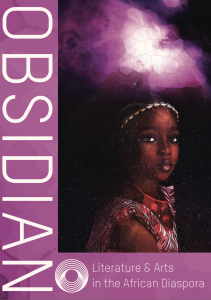 Celebrating more than forty-five years of continuous publication, Obsidian has been resilient in the face of adversity, institutional racism, and structural inequality, and has succeeded in creating a vibrant, independent space for Black literature, art, scholarship, and organic connection. Obsidian succeeds by recognizing, appreciating, and undertaking publishing as a collaborative, values-driven ad/venture.
Celebrating more than forty-five years of continuous publication, Obsidian has been resilient in the face of adversity, institutional racism, and structural inequality, and has succeeded in creating a vibrant, independent space for Black literature, art, scholarship, and organic connection. Obsidian succeeds by recognizing, appreciating, and undertaking publishing as a collaborative, values-driven ad/venture.
Mission is crucial. Ask yourself, Can I accomplish this mission by doing something else? If the answer is yes, then running a literary journal may not be the best choice. Also ask yourself, Do I have the wherewithal, resources, network, energy necessary for a long-term investment? The answer must be yes because the work of an editor-in-chief in this contemporary age is as much about the enterprise of managing a business in a quickly evolving market as it is about curating content.
Obsidian operates toward the liberation, uplift, and life-affirming transformation of Black/folks generally. Ours is an enduring legacy rooted in a vital, ever-urgent mission.
